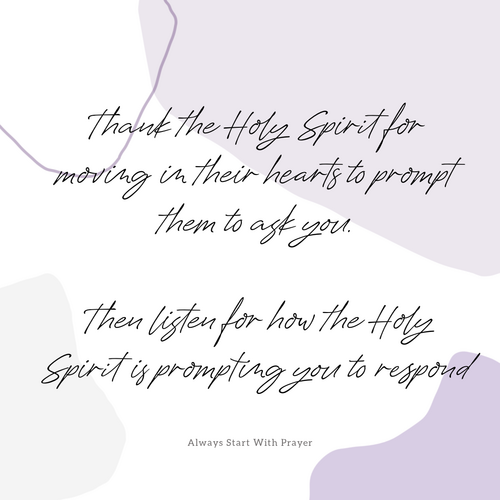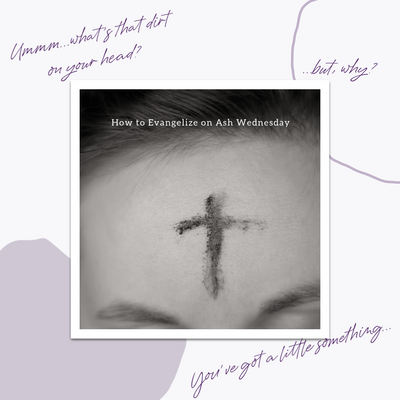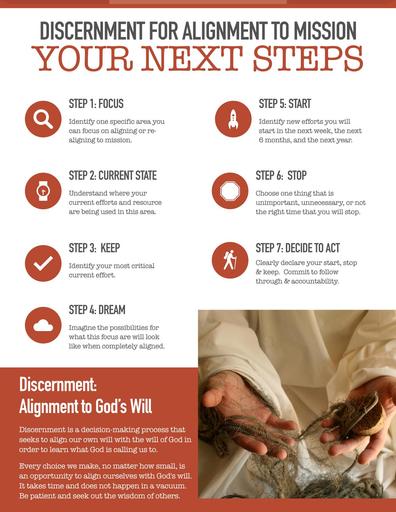What to Say When Someone Asks About the Ashes
We don’t presume to have the perfect response for every situation. But Ash Wednesday often opens brief, unexpected moments of encounter. What matters most is not saying everything, but responding in a way that is honest, human, and attentive to where the other person actually is.
Hey, you've got a little something on your forehead.
A fellow Catholic who forgot it was Ash Wednesday:
Ashes! Oh man, is it really Ash Wednesday today? I totally forgot and didn't go.
Or a confused friend:
Ummm...what's that dirt on your head?
Who's Asking?
The first thing to consider before responding is the other person. What kind of relationship do you have with them? What is their faith background or practice? How open are they to discussions about faith or conversations about Jesus? Evangelization is all about meeting people where they are and helping them take their next best step on their faith journey.
A stranger who is just trying to be helpful and polite in pointing out the smudge they see on your forehead probably isn't ready for a full catechetics lesson on the symbolism of ashes, repentance, and the nature of death.
A friend with whom you've had a few conversations about your faith and who seems open to going a little deeper might be ready for you to share what sorrow for your sins has looked like in your own life, but might not be open to lecture on how the Old Testament prophets used ashes.
An acquaintance who would identify as "spiritual, but not religious" might be able to receive a message about how the ashes are a physical reminder of God's love, but might not be open to the full depth of Jesus' sacrifice on the Cross just yet.
The most important thing to consider when responding to someone asking you about your ashes is how the Holy Spirit might have been moving in their hearts to prompt them to ask you - and what depth of answer the Holy Spirit is prompting you to share.
Evangelization on Ash Wednesday is less about explanation and more about discernment.
What Does It Mean To You?
The second thing to consider is how much you personally understand and enter into the meaning of Ash Wednesday. We can only lead people somewhere we are also trying to go. If evangelization invites others into relationship with Jesus and His Church, then our own Lenten practices must be ordered toward that same relationship.
Before responding outwardly, it’s worth pausing inwardly. What does Ash Wednesday actually mean to you right now – not in theory, but in practice?
Where do Ash Wednesday Ashes come from? (Catholic News Agency)
Questions and Answers about Lent & Lenten Practices (USCCB)
Possible Responses (Not Scripts)
These examples aren’t meant to be memorized. They show different depths of response depending on relationship, openness, and timing.
So, you've considered both where they're coming from and what Ash Wednesday means to you. You've said a short, quick prayer asking the Holy Spirit to help you respond in the most fruitful way and are listening to His promptings. But what do you actually say?
The best responses are open and honest, without being abrasive or condescending.
Possible Answer #1
Having ashes on your forehead isn’t just some weird Catholic thing: it’s a tradition that finds its roots in the Old Testament.
“I turned to the Lord God, to seek help, in prayer and petition, with fasting, sackcloth, and ashes” (Daniel 9:3).
When the ashes are placed on our foreheads in the sign of the Cross, it is a reminder of a few things. First, it is a call to repentance: a physical sign that I am a sinner in need of forgiveness, which is how the prophets used it in the Old Testament. Second, it is to remind me that God created us from the earth and when I die, I will return to it. It might sound morbid, but remembering that this life is not the end is an essential element of my faith.
Possible Answer #2
The ashes are a reminder that God loves me so much that, even when my body returns to the dust, my soul is meant to live forever with him.
“Man is dust and to dust he shall return, but dust is precious in God’s eyes because God created man, destining him to immortality.” (Pope Benedict XVI)
Once a year, my Church spends 40 days really focusing on remembering exactly how much God loves us - even when we don't deserve that love. Today is the first day of that season (which we call Lent), and it starts with this tangible and physical reminder.
Possible Answer #3
Ash Wednesday comes from the ancient Jewish tradition of penance and fasting. The practice includes the wearing of ashes on the head. The ashes symbolize the dust from which God made us. They also symbolize grief, in this case, they are meant to be a physical sigh of the grief I have for the ways I sinned and caused division from God.
Possible Answer #4
Thanks so much! I actually have them there on purpose. I'm Catholic and today is Ash Wednesday.
Sometimes the most faithful response is simply clarity without explanation. Not every question is an invitation to go deeper — and that’s okay.
Following Up
 The most important part of your response isn’t the wording. It’s the posture you carry — whether your presence leaves the other person feeling respected, curious, and free.
The most important part of your response isn’t the wording. It’s the posture you carry — whether your presence leaves the other person feeling respected, curious, and free.
- Be open to continuing the conversation if they ask more questions.
- You might mention that your parish is marking the beginning of Lent that evening and invite them to join you if it seems appropriate.
- Tell them that adding prayer is an important part of your Lenten practice and ask them if there is any specific intention you can add for them over the next 40 days.
- Offer to pray with them right then and there.
Ash Wednesday doesn’t require us to explain everything. It invites us to name Jesus honestly, without using effort or information to replace encounter.
What about you? Have you had a great moment of evangelization on Ash Wednesday? We want to hear about it!
What to Say When Someone Asks About the Ashes
We don’t presume to have the perfect response for every situation. But Ash Wednesday often opens brief, unexpected moments of encounter. What matters most is not saying everything, but responding in a way that is honest, human, and attentive to where the other person actually is.
Hey, you've got a little something on your forehead.
A fellow Catholic who forgot it was Ash Wednesday:
Ashes! Oh man, is it really Ash Wednesday today? I totally forgot and didn't go.
Or a confused friend:
Ummm...what's that dirt on your head?
Who's Asking?
The first thing to consider before responding is the other person. What kind of relationship do you have with them? What is their faith background or practice? How open are they to discussions about faith or conversations about Jesus? Evangelization is all about meeting people where they are and helping them take their next best step on their faith journey.
A stranger who is just trying to be helpful and polite in pointing out the smudge they see on your forehead probably isn't ready for a full catechetics lesson on the symbolism of ashes, repentance, and the nature of death.
A friend with whom you've had a few conversations about your faith and who seems open to going a little deeper might be ready for you to share what sorrow for your sins has looked like in your own life, but might not be open to lecture on how the Old Testament prophets used ashes.
An acquaintance who would identify as "spiritual, but not religious" might be able to receive a message about how the ashes are a physical reminder of God's love, but might not be open to the full depth of Jesus' sacrifice on the Cross just yet.
The most important thing to consider when responding to someone asking you about your ashes is how the Holy Spirit might have been moving in their hearts to prompt them to ask you - and what depth of answer the Holy Spirit is prompting you to share.
Evangelization on Ash Wednesday is less about explanation and more about discernment.
What Does It Mean To You?
The second thing to consider is how much you personally understand and enter into the meaning of Ash Wednesday. We can only lead people somewhere we are also trying to go. If evangelization is meant to invite people into a deeper relationship with Jesus and His Church, then I need to make sure that all my own Lenten practices (including attending Mass on Ash Wednesday) are focused on trying to go deeper in my own relationship with Jesus and His Church.
Before responding outwardly, it’s worth pausing inwardly. What does Ash Wednesday actually mean to you right now – not in theory, but in practice?
Where do Ash Wednesday Ashes come from? (Catholic News Agency)
Questions and Answers about Lent & Lenten Practices (USCCB)
Possible Responses (Not Scripts)
These examples aren’t meant to be memorized. They show different depths of response depending on relationship, openness, and timing.
So, you've considered both where they're coming from and what Ash Wednesday means to you. You've said a short, quick prayer asking the Holy Spirit to help you respond in the most fruitful way and are listening to His promptings. But what do you actually say?
The best responses are open and honest, without being abrasive or condescending. Don't be an Abrasive Abner!
Possible Answer #1
Having ashes on your forehead isn’t just some weird Catholic thing: it’s a tradition that finds its roots in the Old Testament.
“I turned to the Lord God, to seek help, in prayer and petition, with fasting, sackcloth, and ashes” (Daniel 9:3).
When the ashes are placed on our foreheads in the sign of the Cross, it is a reminder of a few things. First, it is a call to repentance: a physical sign that I am a sinner in need of forgiveness, which is how the prophets used it in the Old Testament. Second, it is to remind me that God created us from the earth and when I die, I will return to it. It might sound morbid, but remembering that this life is not the end is an essential element of my faith.
Possible Answer #2
The ashes are a reminder that God loves me so much that, even when my body returns to the dust, my soul is meant to live forever with him.
“Man is dust and to dust he shall return, but dust is precious in God’s eyes because God created man, destining him to immortality.” (Pope Benedict XVI)
Once a year, my Church spends 40 days really focusing on remembering exactly how much God loves us - even when we don't deserve that love. Today is the first day of that season (which we call Lent), and it starts with this tangible and physical reminder.
Possible Answer #3
Ash Wednesday comes from the ancient Jewish tradition of penance and fasting. The practice includes the wearing of ashes on the head. The ashes symbolize the dust from which God made us. They also symbolize grief, in this case, they are meant to be a physical sigh of the grief I have for the ways I sinned and caused division from God.
Possible Answer #4
Thanks so much! I actually have them there on purpose. I'm Catholic and today is Ash Wednesday.
Sometimes the most faithful response is simply clarity without explanation. Not every question is an invitation to go deeper — and that’s okay.
Following Up
 TThe most important part of your response isn’t the wording. It’s the posture you carry — whether your presence leaves the other person feeling respected, curious, and free.
TThe most important part of your response isn’t the wording. It’s the posture you carry — whether your presence leaves the other person feeling respected, curious, and free.
- Be open to continuing the conversation if they ask more questions.
- You might mention that your parish is marking the beginning of Lent that evening, possibly invite them to join you if it seems appropriate.
- Tell them that adding prayer is an important part of your Lenten practice and ask them if there is any specific intention you can add for them over the next 40 days.
- Offer to pray with them right then and there.
Ash Wednesday doesn’t require us to explain everything. It invites us to name Jesus honestly, without using effort or information to replace encounter.
What about you? Have you had a great moment of evangelization on Ash Wednesday? We want to hear about it!


